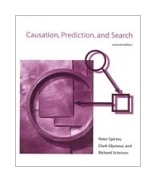|
||
• wydawnictwa polskie
• Zamów informacje o nowościach z wybranego tematu • kontakt
• Cookies na stronie |
CAUSATION, PREDICTION AND SEARCHSPIRTES P., GLYMOUR C.wydawnictwo: MIT PRESS , rok wydania 2000, wydanie Icena netto: What assumptions and methods allow us to turn observations into causal knowledge, and how can even incomplete causal knowledge be used in planning and prediction to influence and control our environment? In this book Peter Spirtes, Clark Glymour, and Richard Scheines address these questions using the formalism of Bayes networks, with results that have been applied in diverse areas of research in the social, behavioral, and physical sciences. The authors show that although experimental and observational study designs may not always permit the same inferences, they are subject to uniform principles. They axiomatize the connection between causal structure and probabilistic independence, explore several varieties of causal indistinguishability, formulate a theory of manipulation, and develop asymptotically reliable procedures for searching over equivalence classes of causal models, including models of categorical data and structural equation models with and without latent variables. The authors show that the relationship between causality and probability can also help to clarify such diverse topics in statistics as the comparative power of experimentation versus observation, Simpson's paradox, errors in regression models, retrospective versus prospective sampling, and variable selection. The second edition contains a new introduction and an extensive survey of advances and applications that have appeared since the first edition was published in 1993. Clark Glymour is Alumni University Professor of Philosophy at Carnegie Mellon University, John Pace Eminent Scholar and Senior Research Scientist at the Institute for Human and Machine Cognition of the University of Florida, and Valtz Family Professor at the University of California, San Diego. 543 pages Księgarnia nie działa. Nie odpowiadamy na pytania i nie realizujemy zamówien. Do odwolania !. |


